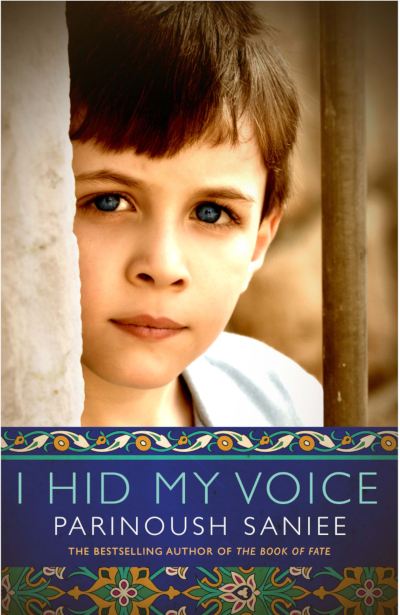(Pedar-e aan Digari)
Parinoush Saniee
Made into an award winning feature film in iran starring the best of Iranian cinema

‘The title, I Hid My Voice, has the ring of a true-life confession, but this compelling and skilfully constructed novel delivers much more than that… It is remarkable for the psychological realism of its depiction of a bright young boy who is badly damaged by the tensions within his family, that he chooses to be judged an idiot rather than show his intelligence … True to the realism that has characterised the telling of Shahaab’s story, the ending is not entirely happy. Some wrongs cannot be righted, as is clearly shown in this touching and beautifully crafted story.’ Irish Examiner
‘A beautiful metaphor of the censorship that dominates the country’ Cultura/s, La Vanguardia
‘”Una voz escondida” is many things but, above all, is a protest novel. (…) But it is also a story of daily life in Iran, where silence is safety. The boy’s mutism is also the mutism of whole nation.’ La Razón, Spain
‘Parinoush Saniee (…) pens this new novel where words left unsaid become a scream against ignorance, cruelty, and indifference.’ El Sol de México
‘In I HID MY VOICE the writer speaks of the fear that pervades Iran, hiding between the desire for truth and the political correctness demanded by political conservatism.’ La Vanguardia Spain
‘The author’s background can be sensed at every turn of the page, Saniee skilfully integrates concepts and theories about the psychology of the child and demonstrates how easy it is to cause, as parents, irremediable damages to a child, but also how easy it is not to cause them.. We can also find meaning through an allegory. Shahab is not only a child who confronts a difficulty, his muteness is in fact that of a nation terrorized by a harsh regime.. it’s a word of warning.. Parinoush Saniee masters the art.’ The Cultural Supplement, Romania
‘I would recommend this book to any parent as a compulsory reading, especially to those who have more than one child. I would recommend it to a father so he can better understand what happens in the soul of his child… The novel reveals two voices: Shahab and his mother; they bring to light the pain of the sensible and imaginative child, the pain of a mother who feels the truth and struggles with an absent father whose only desire is to work.’ The Sunday Journal, Romania
‘Gripping… an agonising childhood in the Iran of the ayatollahs, with its revolutionary committees and moral police always lurking.’ Stavanger Aftenblad Norway
This is the story, based on fact, of a boy who couldn’t speak till the age of 7. He is now 20 and describes the events of his life. Silence is often used by children as a way to protest. The child’s physical disability creates a distance between him and others. His relationship with his father is particularly difficult. As he observes and compares his father’s relationship with his older brother, he begins to believe that the ‘good’ and ‘intelligent’ children like his older brother are their fathers’ sons. Children like him, who are ‘clumsy’ and ‘problematic’, are their mothers’ sons. It is the love and understanding his grandmother gives him that finally gives him the courage to speak.
‘A richly written novel with which Parinoush Saniee digs into the social texture of her country, Iran, and which, while telling the story of the struggles of a boy, portrays the life of women. Tight dialogue and a protagonist who becomes the symbol of hope in a better world.’ La Repubblica Italy
‘HO NASCOSTO LA MIA VOCE is a new literary sensation. A child’s untold words become a scream against heartlessness and indifference.’ Panorama Italy
‘A voice as a metaphor for a country, Iran, where censorship rules.’ La Gazzetta di Mantova Italy
‘In Parinoush Saniee’s novel, the atmosphere is poignant, dominated by Islamic tradition in several aspects: the woman’s emancipation in the form of complicated lies and running away from home; lovers who hide in unhealthy places, far from the severe eye of the komita; the authoritarianism and the emotional censorship… the message is universal though: the negligence of emotional communication slowly fractures all families.’ blog.libris.com Romania
‘A deeply moving book… Shahab’s understanding of his reality is extraordinary well written, with a child’s special interpretation of adult actions. It becomes a beautiful portrait of a young boy who is paralysed by anxiety. What is good about this book is that no one is really good or bad. All are victims, of an oppressive system and of their own unconscious minds.’ Dagbladet Norway
‘When I read this it brought to mind how important it is to get recognition from the people around us… You must be made of stone if this book doesn’t move you.’ Familien
Sales
- Roozbahan Iran
- Abacus/Little Brown UK
- House of Anansi North America
- Garzanti Italy
- Font Forlag Norway
- Polirom Romania
- Janet 45 Bulgaria
- Bertrand Brazil
- Tericum Hungary
- Bertrand Editora Portugal
- Salamandra Spain
- Sonia Draga Poland
- Editions Robert Laffont France
- AmboAnthos NL
- Bata Press Macedonia
- Book Recipe South Korea
- Andesha Kurdish
- Dar Kalemat Arabic
- Blackstone Audio USA
Material: UK, US/Canada, Spanish, Iranian, Norwegian, Romanian and Italian editions (224pp)